It seems like a foregone conclusion: how else would Singapore do a writers’ festival but with seriousness and business-like professionalism? What’s striking about the first few days of the Singapore Writers’ Festival (SWF) though is this: while business sense would dictate the selling of books in relation to the event, there’s also a clear sense here of going beyond that. And the SWF does so by showing us how literature and writing might on the one hand be celebrated as creative endeavor, and on the other assessed as end product with goals of publication and readership, always with the possibility of the text affecting change. This is to say that each of the panels I went to were done professionally at the SWF, where moderators had read the books of the writers they were to have conversations with, where they actually become credible points of reference for a discussion with the audience. My context obviously is the Philippines, where even international conferences suffer not just because of sloppy work by local scholars, but even more so unprofessional moderators who think that hosting à la talk show is what this role calls for.
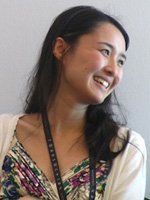
Australian-Cambodian Alice Pung, writer of the memoir "Her Father's Daughter"
But I digress, and I only do so because of envy: much might be said after all for professionalism
especially when it comes to literature and writing, particularly because by our mere existence as writers and critics we demand that it be seen as important. At the SWF, the first thing that’s equated with its importance is a clear respect for writers, which begins with
reading their work beforehand. Thus, a panel on female Asian writers published in the West could actually move from writers reading excerpts of their work, to becoming a discussion on the realities that surround their creative processes, from the marketing of their books in the West to the notions of exoticizing literature by Asian writers. Having read the work of all three writers on the panel – memoirists Alice Pung and Cheryl Lu-Lien Tan and novelist Janice Lee – moderator Phan Ming Yen of The Arts House knew to steer the conversation from writing influences to the question of representation.
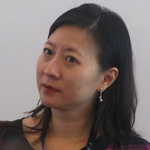
Singaporean Cheryl Lu-Lien Tan, writer of the memoir "Tiger in the Kitchen"
Happening as an informal exchange, what was ultimately refreshing about this panel was how it rendered all three writers honest and candid. They referred freely to other writers as influences (Emily Hahn for example), but also truthfully dealt with the question of representation, saying that this was not a complex process of wondering for whom they spoke, that in fact these came from the notion of just having stories that they thought they could tell themselves. Asked about the process of writing, romantic notions of
being writer are thrown out the window: Pung highlights the fact of her day job as lawyer that keeps her writing down to a couple of days a week; Lu-Lien Tan works as a journalist and had to be holed up in an artist space for weeks in order to finish the book; Lee has real life and work, and might get a whole paragraph in or none at all on any given day.
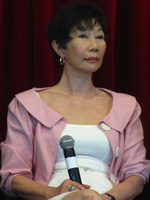
Singaporean fictionist Catherine Lim spoke on the writer's role as commentator in an oppressive society
Asked about the marketing itself of books as probable sites of exoticization, candidness carried this discussion over to the absurd: where a cheongsam and chopsticks are default for Singaporean Lu-Lien Tan’s
A Tiger in the Kitchen, a more daring title is sacrificed for Pung’s
Her Father’s Daughter, an inaccurate UK cover is forgiven for Lee’s
The Piano Teacher. This openness can only be premised on the function of the moderator here, where comfortable exchange doesn’t spiral down into just witty repartee. But there was still a lot of that, mind you. This was true even in the panel that dealt with the seriousness of politics and literature, and which dared ask the question: is the pen always mightier? Moderated by academic Cherian George, Ukranian novelist Andrey Kurkov, Singaporean novelist Catherine Lim and Chinese poet Yang Lian treated the audience to what might be the most interesting because it was the most daring of panels. George himself began the panel by highlighting the fact that while words have never been as powerful as they are today, it’s also at this time that the pen can be used to support the sword. It was no surprise that this panel became a no-holds-barred discussion on how literature has been changed by evolving democracies and oppression across the world.
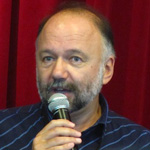
Ukrainian novelist Andrey Kurkov on oppression and relevant literature
Kurkov, speaking about literature in Russia and Ukraine, began with a conclusion: sad as it sounds, oppression brought a kind of literature that was critical and involved in the society at large, which in post-Soviet Russia has been transformed into commercialized literature by young artists focused on sex, drugs and rock ‘n’ roll. It seems like a version of apathy really, one that’s also the context of Lim’s place in Singaporean culture and politics as an icon of dissent, speaking as she always has about government and her decision to shift between fiction and commentary. To Lim, regardless of genre, the writer is required to be informed and vigilant about her context, becoming her own check and balance, be it in terms of writing or her role in the bigger society.
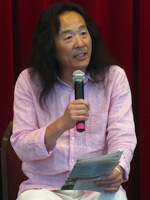
Chinese poet Yang Lian demands words with meaning
Poet Yang maintains this vigilance even as he has been exiled from China since the Tiananmen Square protests in 1989. From the outside looking in, Yang sees very individualistic movements in the arts in China, where younger poets have a false sense of power within a community changed by consumption, and the goal of making money. Yang asserts that in 1989, words were about slogans, but in 2011, the demand is for words to mean something, and the young Chinese artist has yet to prove that he will speak for the people. That these three writers speak
for the people is default; that they speak to
us even as we are writers and critics from elsewhere in the world can only resonate. We after all come from a nation where writers have died by the pen, from the National Hero as novelist to those jailed and killed during Martial Law. We are also in a present where someone like cultural worker Ericson Acosta can be jailed, a present where, while we lament the lack of readers, in reality there’s comfort in the fact of how small the writing and literary circle is – the better to maintain the status quo, the easier to label writers who think differently as outsiders.
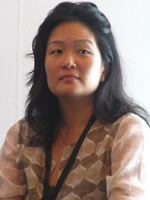
Novelist Janice Lee from Hong Kong, writer of "The Piano Teacher"
Yet, across these two panels of six writers and two moderators from different parts of the world, the outside is shown precisely to be the space to begin taking stock of what’s wrong really with the systems we are involved in. It’s from the outside that we can take stock of ourselves as writers, because while it might mean romanticizing what’s in there, while it could mean failing tremendously at representing what’s within, it’s also ultimately true that it’s the outside that allows us to dust ourselves of the parochialism and falsities within, where familiarity and friendship render criticism invalid, and where nation and context are seen as secondary to the
task of writing. It seems another foregone conclusion is in order: SWF reminds us that in fact creativity is tied to real life and nation, and that in the end, it’s still about writers being responsible citizens of nation. We work with that premise, and re-assess our ourselves as writers, then maybe we’re a couple of steps closer to treating our writing and literature as serious business, readership or no readership, selling books notwithstanding. -
YA/HS, GMA News The Singapore Writers Festival runs from October 21 to 31, 2011. 










